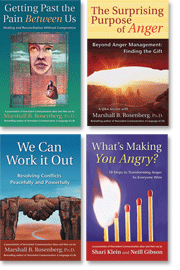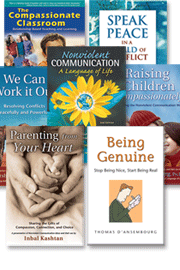Gandhian Principles... continued
For some time, I felt similarly. I was happier when I heard people talk about Compassionate Communication instead of Nonviolent Communication (NVC) because it felt more positive. After all, the practice of NVC itself is about focusing on what we want and where we are going instead of looking at what's not working. So why would the name not reflect this focus?
Like others, I was unaware of the long-standing tradition of nonviolence to which the practice of Nonviolent Communication traces its origins. Then I learned more about Gandhi's work and the Civil Rights movement. That is when I fell in love with the name Marshall Rosenberg gave to this practice.
That love has deepened over the years. Now I want to bring out the continuity so as to situate NVC within the tradition of nonviolence. I do this by exploring seven core principles of Gandhian nonviolence that are also reflected in the practice of NVC.
The word nonviolence is the closest literal translation that Gandhi found to the Sanskrit word ahimsa. In Sanskrit, negation is sometimes used to suggest that a concept or quality is too great to be named directly.
"Ahimsa is unconditional love," writes Eknath Easwaran, in his preface to Gandhi the Man. "The word we translate as 'nonviolence' is . . . central in Buddhism as well: Ahimsa, the complete absence of violence in word and even thought as well as action. This sounds negative, just as 'nonviolence' sounds passive. But like the English word 'flawless,' ahimsa denotes perfection." As another example, avera, which means "love" in Sanskrit, literally translates into "non-hatred."
Hinduism is not the only tradition that honors the unnamable. Judaism has a similar practice. The name of God is unsayable in Hebrew, being letters without vowels, without instructions for how to read them. Some things are beyond words. Nonviolence is one of them.
Gandhi also used other terms for his practice. One word that he commonly used is Satyagraha, which translates as "truth force." At times, he also used the term "soul force." Whichever term he used, Gandhi made it abundantly clear that nonviolence is a positive force, not a negation.
"Satyagraha means 'holding to the truth in every situation'. This is ahimsa, which is more than just the absence of violence; it is intense love." (Gandhi the Man, p. 53)
"A Satyagrahi has infinite patience, abundant faith in others, ample hope." ( Young India , Mar 19 th, 1931)
Why is nonviolence equated with love? Clearly, it's different from forms of love that sometimes have been the impetus for great violence. (Think of Othello as one such example.) What is this kind of love?
It appears to me that Jesus, Gandhi, Marshall Rosenberg, and those of us following their tradition through the practice of NVC, think of love as the full radical acceptance of the humanity of every person, regardless of how unhappy we are with their actions.
Indeed, Gandhi said, "It is nonviolence only when we love those that hate us." (Gandhi the Man, p. 108) These words are strikingly similar to a core principle of Jesus' teachings: "Love thy enemy." (Matthew 5:44) Both of them speak to the vision of a heart that is fully open to everyone, especially our enemies. Marshall Rosenberg, too, has said that the practice of NVC emerged from his attempt to understand love.
I understand this love as the commitment to act in ways that uphold everyone's humanity. It means caring for the wellbeing of the other person even when we are in opposing positions; even when all that we value is at stake. This is one essence of what nonviolence means.
Everything else follows from this principle. I am reminded of a Talmudic story about a man who came to Hillel, one of the famous rabbis, and asked Hillel to teach him the Torah standing on one foot.
Hillel is reputed to have said, "Love thy neighbor as thyself, and the rest is commentary." Similarly both Gandhian nonviolence and the practice of NVC are, in some ways, elaborations on this one key principle: whatever the circumstances, no matter what else is going on, we are committed to caring for the wellbeing of all.
The practice of NVC gives specific form to this commitment. We apply our hearts, focus our consciousness, and bring active attention to transcending and transforming fear and judgment. We excavate underneath our habits to understand our needs, so we can know what longings, dreams, and values inform our reaction to another.
This allows us to reach for and maintain an open heart to the needs of another. When we hear others with full empathic presence, their core, irreducible humanity shines forth. I think of this quality of practical open-heartedness, of caring for the well-being of someone regardless of her or his actions, as an essential ingredient of the love I want to live in the world.
The next segment of this 7-part series explores the second principle that NVC shares with Ghandian nonviolence: a call to live courageously and take on the possible consequences of choosing to live a life of love and integrity.
The complete bibliography for the series can be found online at NVC Gandhian Principles Bibliography.
Miki Kashtan is a co-founder of Bay Area Nonviolent Communication. She leads workshops and intensive retreats in Nonviolent Communication throughout the United States and in Japan, Europe, Brazil, and Africa, and offers mediation, meeting facilitation, coaching, and training for organizations. Miki hosts the Conflict Hotline, a monthly live call-in TV show, and blogs regularly at The Fearless Heart. She holds a Ph.D. in Sociology from UC Berkeley and her articles have appeared in Tikkun magazine and elsewhere.
Keep learning these vital communication skills with these books and training resources:
This Month's Specials:
- NVC Conflict Resolution Book Package - Save 50% off list price through March 1, 2011
- Reference Library Book Package - Save 60% off list price through March 1, 2011
Every Day Specials:
- Getting Past the Pain Between Us - Save 30%-50% on this booklet every day from PuddleDancer Press
- The Surprising Purpose of Anger - Save 30%-50% on this booklet every day from PuddleDancer Press
- We Can Work It Out - Save 30%-50% on this booklet every day from PuddleDancer Press
- What's Making You Angry? - Save 30%-50% on this booklet every day from PuddleDancer Press
- NVC Starter Kit Book Package - Save 40%-50% on this book package every day from PuddleDancer Press
- NVC Marshall B. Rosenberg, Ph.D. Book Package - Save 45%-55% on this book package every day from PuddleDancer Press






